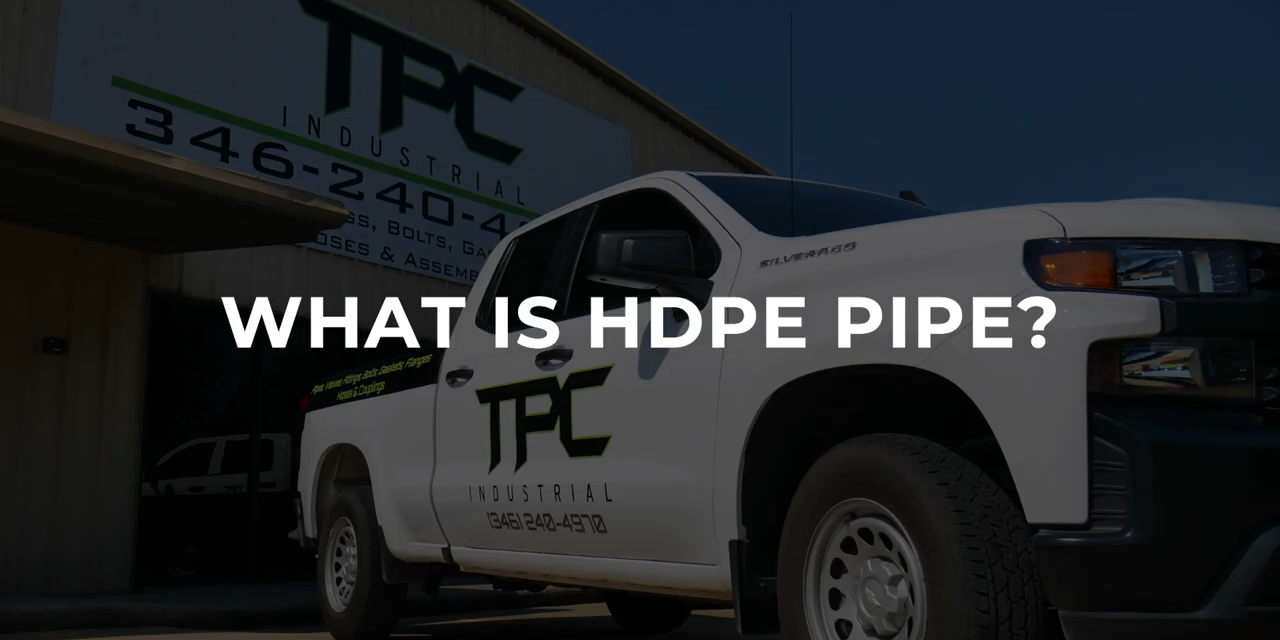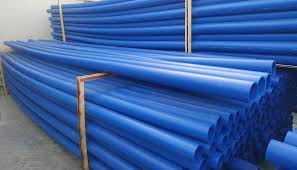A: Another grade of pipe that TPC provides is HDPE pipe, which is high-density, polyethylene pipe. It’s used on all your underground lines—it’s used for fluid or gas transfer. Also, to replace your concrete piping, to make sure that all your pipe underground—stays underground and doesn’t break down as concrete pipe does.
HDPE Pipe is a very economical and durable solution for a wide variety of piping needs in all sectors. Made from polyethylene, it is vetted and proven effective for use in buried ground, above ground, surface laid, floating, slip lined, and subsurface marine applications. HDPE pipe is often used in the oil & gas, wastewater management, and agricultural industries among others.
It is more than capable of carrying wastewater, slurry, chemical substances, toxic waste, and even compressed gases. In short, it is highly adaptable to any industry, any application, and any fluid or gas medium without needing frequent repair. In fact, compared to all other piping used in some of these applications—it has the lowest repair rate.
Whether you are looking for flexibility, long lifespan, resistance to chemicals, or easy installation—HDPE pipe checks all the boxes and then some. You can find HDPE pipe used in industries and applications such as:
- Electrical & Communication Conduits
- Municipal Storm Drains
- Mining
- Oil & Gas
- Dredging Applications
- Glass Manufacturers
- Power Plants
- Paper Mills
As you can see, HDPE is quite popular no matter the industry and it’s for good reason. In fact, HDPE has quite a few advantages over steel, concrete, and iron piping in many application. As we briefly cover some of the advantages of HDPE, you will come to find ways that it can benefit your projects. We have customers from many different industries including petroleum, municipalities, commercial farms, mineral mines, and more that frequently depend on us for their piping needs.
DN150 HDPE pipes for gas delivery
HDPE PIPE: TIME SAVER & ECONOMICAL
HDPE pipe not only saves you time due to its easy installation, it is also very economical. It has an exceptionally large impact on budgets due to:
LOWER COST OF OWNERSHIP
- Corrosion Resistant—Unlike traditional metal or concrete mains, HDPE pipe cannot rust, corrode, or rot. This means fewer repairs, replacements, and maintenance. Concrete and metal on the other hand, frequently rust, rot out or have other durability issues. HDPE performs exceedingly well in applications such as mining, dredging, and similar projects. It outlasts piping materials that cost more while offering outstanding resistance. HDPE is also unfazed by corrosive acids, bases, salts, and bacteria or fungi, as well as other organic matter.
- No Leakage— Since this piping uses joints that are heat fused, there is no chance for leakage. Heat-fused joints are used to create a homogenous connection that prevents liquids or gasses from leaking whatsoever.
- Consistent Optimal Flow Rates—High-density polyethylene pipe has a smoother surface than steel, cast iron, ductile iron, or concrete. All of those pipes have microscopic pits and divots to some extent which promotes scale and matter buildup. HDPE pipe has a smaller diameter that can produce the same flow rate at the same level of pressure. HDPE also has a remarkably high resistance to scale or build-up of other elements. This prevents tuberculation, allowing for that maximum flow without resistance.
- Exceptional Water Hammer Resistance—Specifically designed to withstand sudden changes in pressure and extreme surges.
- Extremely Strong— Due to its high strain limits, breakage due to frozen pipes is practically unheard of.
- Lower Repair Frequency—Compared to traditional piping, HDPE pipe saves more money since repair frequency is very low. Therefore, HDPE pipe nets a better value once installed properly, as it can last over 100 years without issue.
- No Water Loss/Nuisance Treatment Problems— Since there is no exfiltration or infiltration possible, potable water shrinkage and groundwater nuisance treatment costs that accompany traditional pipe are non-existent.
LOWER COST OF INSTALLATION
- Perfect For Trenchless Construction— Although trenchless technology is nothing new, it’s become more widely used since it’s less invasive. Sewer pipe repair and replacement now require less disturbance to people, infrastructure, and traffic. HDPE pipe makes trenchless much easier due to its flexibility and durable nature. You will find that HDPE pipe is also perfect for standard trenching as well for water mains and other pipelines.
- Fewer Fittings Needed— Since the piping is so flexible, it can allow a bend radius of up to 25x the outside diameter of the pipe used. This greatly reduces the number of fittings needed for any given project. HDPE pipes also handle shifting soil with ease, so they’re perfect for areas with high seismic activity. Also, its flexibility solves many problems that are encountered with concrete, PVC, and iron pipes.
- No Thrust Blocking Needed—Since joints are heat fused, there is no possibility of joint separation or pipe movement. The heat joints fully restrain the piping.
- Lightweight Means Easy Logistics—Since the pipe is noticeably light and available in longer lengths, there are substantial savings on labor and install equipment. HDPE pipe is much easier in terms of handling and installation compared to steel, iron, and concrete. This reduces costs and boosts your ROI. You must remember that HDPE is one-eighth as dense as steel, meaning it doesn’t need that heavy moving equipment. It also costs much less to ship, so you save money before even using it. It also means a much safer workplace as there are fewer hazards involved.
- Easy Learning Curve—Learning how to implement HDPE in the design and installs of your piping systems is easier than it may seem. You can easily train your crew to use HDPE to gain an advantage in new and existing applications.
WHAT IS HDPE?
The HDPE this unique piping is made of is a thermoplastic of the polyethylene variety, which is made from petroleum. Of the three polyethylene resins, it is the most widely used due to its flexibility and high tensile strength.
Known for being a very versatile and processable resin that is inexpensive and recyclable, its usage has spiked in many industries. In fact, it is one of the most often used plastics in business today. However, even though it was discovered in 1898, production didn’t take off until the 1950s. By then, improvement in the manufacturing process made production more efficient and less costly.
Naturally, this made mass production at an affordable rate a reality and therefore more HDPE found its way into everyday items. HDPE has an amazingly simple, no-frills chemical structure compared to other plastics, making it easy to process into different end products. It can be found in packaging and prescription drug bottles, building sheath, and of course, HDPE pipe to name a few applications.
ENVIRONMENTALLY FRIENDLY
For companies trying to gain EPA certifications and earn carbon credits for environmentally conscious business practices, HDPE is a perfect fit.
- HDPE requires less energy to manufacture than steel, iron, concrete, and other traditional piping.
- Due to its lightweight nature, it uses less fuel to transport, which reduces emissions.
- HDPE is flexible, and joints can be heat fused rather than needing a ton of fittings.
- You can use a smaller pipe due to the smoothness of the surface. This means less ground disruption in the area of installation.
- The HDPE pipe connects via heat fusion eliminating leaks of potentially dangerous chemicals or wasting potable water.
- These pipes do not release hazardous levels of toxins into the atmosphere, water, or the soil during production.



